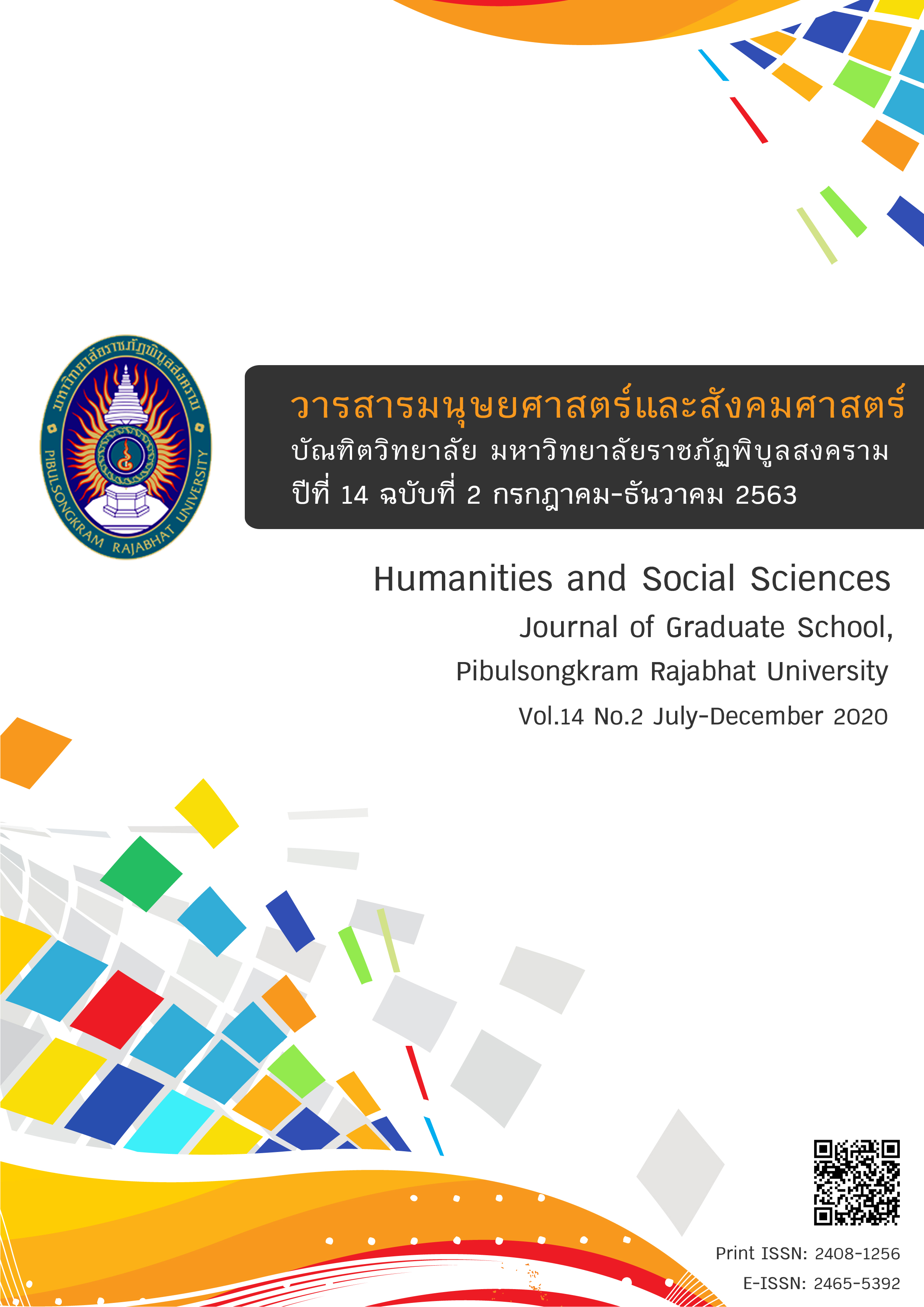The Priority Needs Analysis of Secondary School Academic Management Based on the Concept of Skill Development for Green Economy
Keywords:
Skills for green economy, Skill development, Academic management, Secondary school, The priority needsAbstract
This research was conducted using a survey research method. The objective of this research was to analyze the priority needs of academic management based on the concept of skill development for green economy. The sample groups used in this research were 341 secondary school by multi-stage random sampling. A total of 1,705 providers includes school director, head of academic affairs, head of subject department, and academic teacher. The data were collected by using 5 rating-scale questionnaire; 70.56% of questionnaires were returned and analyzed by frequency distribution, percentage, mean, standard deviation, and Modified Priority Needs Index (PNIModified). The findings revealed that the ranking of priority needs in academic management based on the concept of skill development for green economy, the area with the highest priority needs index was measurement and evaluation (PNIModified = 0.401), followed by the teaching and learning management (PNIModified = 0.357), and curriculum development (PNIModified= 0.319) respectively. When considered in each aspect, it was found that the skills for the green economy which had the highest priority needs index in each area were as follows: (1) curriculum development area was entrepreneurial skills, marketing and business skills for the environment (PNIModified = 0.371), (2) teaching and learning management area was entrepreneurial skills, marketing and business skills for the environment (PNIModified = 0.418), and (3) measurement and evaluation area was systematic skills and risk analysis for sustainability (PNIModified = 0.448).
References
กระทรวงศึกษาธิการ. (2550). กฎกระทรวงศึกษาธิการ กำหนดหลักเกณฑ์และวิธีการกระจายอำนาจการบริหารและการจัดการศึกษา พ.ศ. 2550. สืบค้น 27 มิถุนายน 2560, จาก http://backoffice.onec.go.th/uploaded/Category/Laws/RuleMetDistEdMnt2550-02-12-2010.pdf
บุญเชิด ภิญโญอนันตพงษ์. (2544). การวัดและประเมินผลการศึกษา: ทฤษฎีและการประยุกต์. กรุงเทพฯ: อักษรเจริญทัศน์.
พงษ์ชัย บุญคง และถนอมวรรณ ประเสริฐเจริญสุข. (2553). ปัญหาการบริหารจัดการหลักสูตรสถานศึกษาโรงเรียนเอกชน อำเภอเมือง จังหวัดขอนแก่น. วารสารศึกษาศาสตร์ ฉบับวิจัยบัณฑิตศึกษา มหาวิทยาลัยขอนแก่น, 4(4), 116–122.
รุ่งตะวัน งามจิตอนันต์. (2561). การศึกษากับการพัฒนากำลังคนเพื่อภาคอุตสาหกรรมในอนาคตอย่างยั่งยืน. วารสารการศึกษาไทย, 15, 5-11.
สถาบันระหว่างประเทศเพื่อการค้าและการพัฒนา. (2561). นโยบายและกลยุทธ์การพัฒนาเยาวชนตามกรอบนโยบายความเป็นผู้ประกอบการของ UNCTAD. สืบค้น 20 ธันวาคม 2562, จาก http://www.itd.or.th/wp-content/uploads/2018/09/PPT-RF18_Youth-61.pdf
สมเกียรติ ตั้งกิจวานิชย์ และศุภณัฏฐ์ ศศิวุฒิวัฒน์. (2555). ความล้มเหลวของระบบการประเมินผลการศึกษาไทย: สาเหตุและข้อเสนอแนะ. สืบค้น 18 ธันวาคม 2562, จาก https://thaipublica.org/2012/02/failure-thai-educational-system/
สุวิมล ว่องวาณิช. (2558). การวิจัยประเมินความต้องการจำเป็น (พิมพ์ครั้งที่ 3). กรุงเทพฯ: สรรคุณค่าวิทยา
สำนักงานคณะกรรมการพัฒนาการเศรษฐกิจและสังคมแห่งชาติ. (2557). รายงานการศึกษาโครงการขับเคลื่อนการเติบโตสีเขียวของเมืองภายใต้แผนพัฒนาเศรษฐกิจและสังคมแห่งชาติ ฉบับที่ 11. สืบค้น 26 สิงหาคม 2560, จาก http://www.dsdw2016.dsdw.go.th/doc_pr/report-green.pdf
_______. (2560). แผนพัฒนาเศรษฐกิจและสังคมแห่งชาติ ฉบับที่ 12 (พ.ศ. 2560 – 2564). สืบค้น 26 สิงหาคม 2560, จาก http://www.nesdb.go.th/ewt_dl_link.php?nid=6422
สำนักงานนโยบายและแผนทรัพยากรธรรมชาติและสิ่งแวดล้อม กระทรวงทรัพยากรธรรมชาติและสิ่งแวดล้อม. (2560). รายงานคุณภาพสิ่งแวดล้อม พ.ศ. 2559. นนทบุรี: ลายเส้น ครีเอชั่น.
สำนักงานเลขาธิการสภาการศึกษา. (2561). การจัดการศึกษาเพื่อพัฒนาความเป็นผู้ประกอบการ. กรุงเทพฯ: พริกหวานกราฟฟิค.
สำนักงานเลขานุการของคณะกรรมการยุทธศาสตร์ชาติ สำนักงานคณะกรรมการพัฒนาเศรษฐกิจและสังคมแห่งชาติ. (2560). ยุทธศาสตร์ชาติ พ.ศ. 2561 – 2580 ฉบับย่อ. กรุงเทพฯ: ม.ป.พ.
อุทัย บุญประเสริฐ. (2540). หลักสูตรและการบริหารงานวิชาการในโรงเรียน. กรุงเทพฯ: พิมพ์ เอส ดี เพรส.
Barkhordari, S., Fattahi, M., & Azimi, N. A. (2019). The Impact of knowledge-Based economy on growth performance: Evidence from MENA countries. Journal of the Knowledge Economy, 10, 1168–1182.
Cedefop. (2010). Skills for green jobs: Country Report United Kingdom. Retrieved from https://www.cedefop.europa.eu/files/country_report_uk.pdf
Herman, J. L., & Winters, L. (1992). A practical Guide to Assessment. London: Publication Data.
HM Government. (2011). Skills for a green economy. Retrieved from https://assets.publishing.
service.gov.uk/government/uploads/system/uploads/attachment_data/file/32373/11-1315-skills-for-a-green-economy.pdf
Kamis, A., Mustapha, R., Wahab, N. A., & Ismail, B. L. H. (2016). Green Skills as an Added-Value Element in Producing Competent Students. International Journal of Engineering Research and Applications, 6(11), 12-21.
OECD/Martinez-Fernandez. C, Hinojosa C, Miranda G. (2010). Green jobs and skills: the local labour market implications of addressing climate change, 8 February 2010, working document, CFE/LEED, OECD, www.oecd.org/dataoecd/54/43/44683169.pdf?contentId=44683170
Pavlova, M., & Huang, C. L. (2013). Advancing Employability and Green Skills Development: Values Education in TVET, the Case of the People’s Repubic of China. Skills Development for Inclusive and Sustainable Growth in Developing Asia-Pacific, 19, 327–343.
Senge, P. M. (1993). The Fifth Discipline: The Art & Practice of the Learning Organization. London: Century Bussiness.
Strietska-Ilina, O., Chirstine, H., Mercedes, D. H., & Shinyoung, J. (2011). Skills for Green Jobs A Global View. Spain.
The Food and Agriculture Organization of the United Nations. (2016). State of the World’s Forest 2016. Retrieved from http://www.fao.org/documents/card/en/c/ffed061b-82e0-4c74-af43-1a999a443fbf/
Downloads
Published
How to Cite
Issue
Section
License
Any articles or comments appearing in the Journal of Humanities and Social Sciences, Rajabhat Phibulsongkram University, are the intellectual property of the authors, and do not necessarily reflect the views of the editorial board. Published articles are copyrighted by the Journal of Humanities and Social Sciences, Rajabhat Phibulsongkram University.









